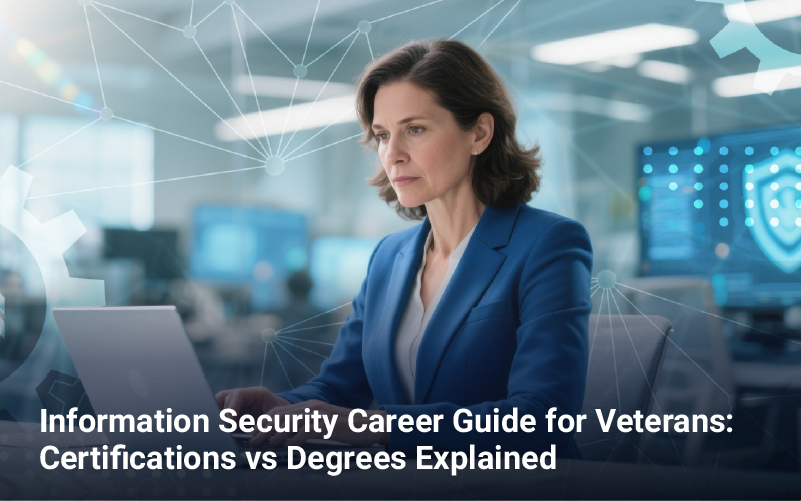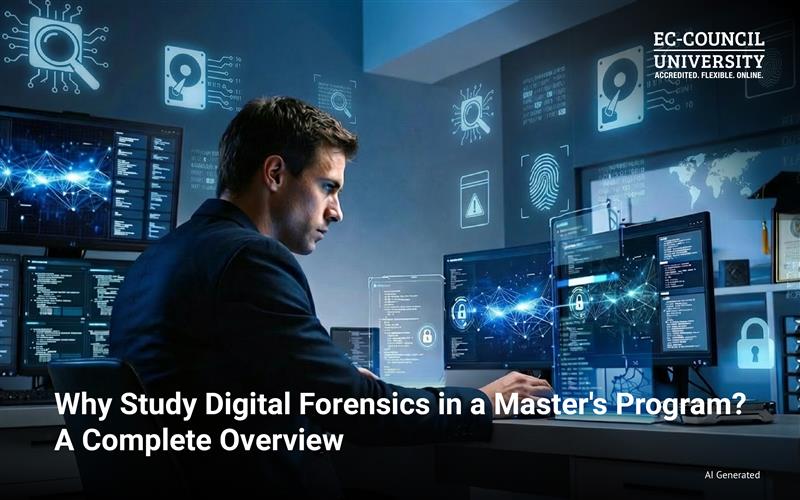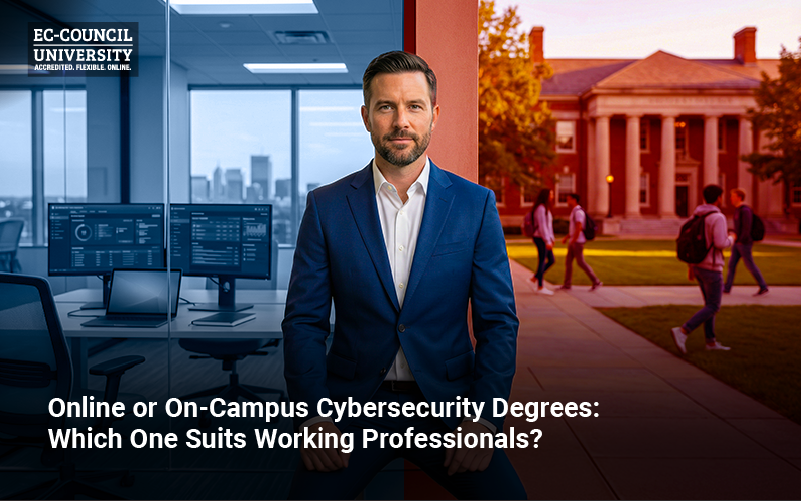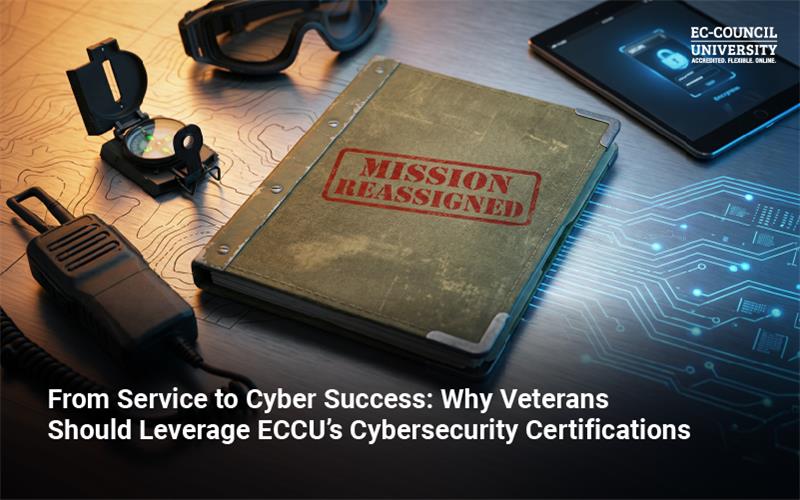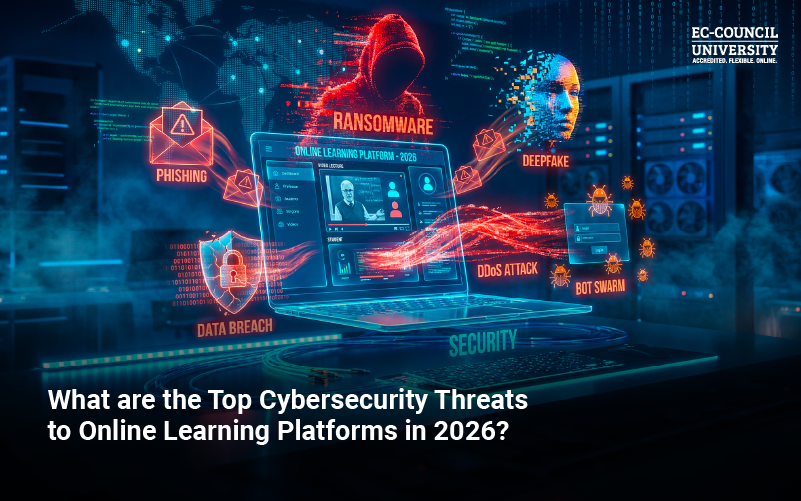Information security has emerged as the most in-demand career path today. Particularly among veterans like you transitioning into civilian life and looking to make a career in the industry. Your technical operations and intelligence background uniquely position you to thrive in various information security roles. However, a crucial decision on whether you should pursue certifications or an information security degree strikes you at the moment.
Should you aim to upskill quickly with a graduate certification, invest in a degree for foundational depth, or find a middle ground that offers the best of both?
What should be your next course of action and priority? Whether you are an active-duty member, nearing transition, or already a veteran, understanding the best educational strategy is key to maximizing your career trajectory.
Breaking down the career landscape, the strengths and weaknesses of each path, and discovering how you can align your educational choice with your unique goals and timelines.
Understanding the Career Landscape for Veterans in Information Security
Information security isn’t just a popular field, but a booming industry in today’s digital age. Government agencies, private contractors, financial institutions, healthcare systems, and nearly every industry are seeking skilled security professionals. According to multiple industry reports, the global information security workforce needs millions of professionals to meet current and future demand.
Active-duty members and veterans like you bring skills that align naturally with information security roles. Your attributes, combined with your strong background, make you an attractive candidate for information security positions.
The typical military-to-information security transition roles include
- Information Security Analyst
- Network Engineer
- Systems Administrator
- Cybersecurity Analyst
and more
Additionally, there is a strong demand for individuals who have maintained government security clearances in government and defense contracting security roles. These roles often come with higher pay, better job security, and unique advancement opportunities.
Certifications vs Degrees: Choice of Career Paths Explained
In the competitive job market, both certifications and degrees hold significant value. Certifications offer targeted skills and faster job readiness, while degrees provide comprehensive education and long-term career development. Making the right choice is crucial for your successful veteran’s career transition into information security roles.
Certifications: Fast Track to Information Security Career
Why Choose Certifications?
- Quick Transition: Ideal for getting job-ready with specialized skills in months.
- Focused Skills: Targeted training in areas like network defense, ethical hacking, or incident response.
- Cost-Effective: Generally more affordable than degrees.
- Industry-Recognized: Credentials like CEH, CND, CCISO, and CCSA certifications are globally recognized.
Consider the Limitations
- Narrow Scope: Focuses on specific skill-sets, tools, and techniques, not strategy management or leadership.
- Ongoing Renewals: Certifications are required to be renewed with continuing education or retesting.
- Leadership Ceiling: May not be enough for senior or management roles in corporate or federal sectors.
Degrees: Long-Term Career Growth
Why Choose a Degree?
- Broader Coverage: Gain comprehensive education that includes both technical and strategic areas like cybersecurity, leadership, risk management, and compliance.
- Leadership Roles: Get equipped with strong strategic, communication, decision-making, and management skills.
- Employers’ Preference: Be the preferred choice for federal and higher positions in the corporate sector.
- Career Longevity: Build foundation for sustainable post-military career transition and growth.
Consider the Limitations
- Time-Intensive: Typically, 2–4 years, though online/part-time options exist.
- Higher Cost: Degrees are more expensive, but military benefits like the Post-9/11 GI Bill® can offset most expenses.
Key Considerations for Choosing the Path that is Right for You
Choosing between certifications and degrees will depend on your personal and professional goals. Consider the following points when making the decision:
- Transition Timeline
How close are you to retiring or separating? If you are 12–24 months from a veteran to civilian life transition, an online degree with certifications might allow you to stack both credentials and prepare for a smoother job hunt.
- Professional Commitment
Are you on a full-time job and short on time? Certifications or an online degree fits the tight schedule.
- Career Goals
Do you aim for a hands-on technical role or envision yourself in managerial or leadership roles? Certifications are ideal for immediate, tactical positions while a degree is best suited for strategic roles and long-term growth.
- Education Budget
Do you have a limited budget for your education? Pursuing certification or a degree program approved for VA education benefits may be a quick fix.
- Cyber Role Requirements
Looking to meet baseline requirements for cyber roles in government or defense? An online degree embedded with certification is your best bet.
ECCU’s Degree and Graduate Certificate Programs: The Best of Both Worlds
ECCU is a military-friendly university offering online degrees specifically designed for information security and cyber careers. ECCU’s programs support career transition for veterans by including certifications that streamline the path to academic and professional recognition.
For many veterans, a mixed approach of earning certifications while working toward a degree is ideal. EC-Council University offers such integrated programs. The accredited degrees also include industry certifications within the curriculum. That means you can graduate with academic and professional credentials, saving time, money, and effort.
- Time and Flexibility
Balance your studies while transitioning, or in a full-time job, by opting for ECCU’s 100% online degree and graduate certifications.
- Education Benefits
Maximize VA education benefits with ECCU. Veterans like you can pursue an accredited degree with minimal to zero cost, depending on your eligibility for programs like the Post-9/11 GI Bill®.
- Career Goals
Prepare for tactical and strategic roles with ECCU degrees that blend hands-on cyber skills with leadership, risk management, and compliance training.
- Career Transition
Transition into cybersecurity with credentials that grow with your career. Whether you are an active-duty member, nearing transition, or already a veteran, ECCU’s range of programs allows you to start with individual courses and transition into a full degree.
- Career Progression
Unlock long-term career progression, enabling movement into senior roles in government, defense, or corporate sectors with ECCU degrees that carry global recognition in cybersecurity.
- Industry Aligned Credentials
Meet the employers and the federal requirements of industry credentials with ECCU’s degree. You can graduate with both a degree and embedded EC-Council certifications.
Cybersecurity Certifications and Degrees Play Critical Roles
There is no universal answer to whether a degree or certification is right for you. The best path depends on your timeline, goals, and current circumstances. For many, the smartest strategy is to pursue both, leveraging certifications for immediate employability while working toward a degree for long-term success.
If you are a military service member or veteran exploring a cybersecurity career, consider EC-Council University’s online degree and graduate certification programs. ECCU is a Cybersecurity University that offers flexible, accredited education combining degrees with embedded certifications. It is the most strategic way to prepare for a meaningful, sustainable post-military career in cybersecurity.
Frequently Asked Questions
Veterans bring vital skills like discipline, leadership, operational security awareness, and qualities that align perfectly with the demands of information security. They also have active or transferred security clearances, which is an added benefit. These strengths align well with the requirements for cybersecurity roles such as Information Security Analyst, Network Engineer, Systems Administrator, or Cybersecurity Analyst, especially in government and defense sectors.
Certifications offer a fast and affordable way to get job-ready by building practical, in-demand skills like network defense, ethical hacking, and incident response. Most can be completed in just a few months and are widely recognized—especially EC-Council certifications like the CEH, CND, CPENT, CCISO, and CCSA.
Certifications typically focus on a narrow set of technical skills, prioritizing hands-on tools and quick problem-solving over broader strategic or leadership development. They also require regular renewal through continuing education or retesting, and may not be enough to qualify for senior or management-level positions.
Degrees offer a well-rounded education that covers technical skills along with strategic, managerial, and leadership areas like risk management, compliance, and communication. Employers often prefer candidates with degrees for senior or federal positions, and a degree can provide a strong foundation for long-term career advancement.
Degree programs typically take 2–4 years to complete (though online or part-time options exist) and tend to be more expensive. However, veterans may offset costs using their education benefits like the GI Bill®.
Your choice depends on your timeline, goals, and available resources:
- Transitioning from the military soon (12–24 months out)? Combining certifications with an online degree can be a smart, strategic move.
- Working full-time? Online degree programs with embedded certifications offer the flexibility you need.
- Looking to enter the field quickly? Start with short certification courses to gain immediate technical skills.
- Aiming for leadership roles down the line? A degree provides the strong foundation required for advancement.
- On a tight budget? Approved institutions and their degrees may be fully covered by veteran education benefits.
- Pursuing government or defense roles? Degrees that include industry certifications often meet baseline credential requirements.
EC-Council University (ECCU) offers fully online degree and graduate certificate programs that blend academic education with embedded industry certifications. This “best of both worlds” approach enables students to graduate with both an accredited degree and respected professional credentials—streamlining the path to career advancement.
ECCU also provides dedicated veteran enrollment advisors who assist with eligibility requirements, Certificate of Eligibility (COE) submission, navigating benefit-related challenges, and the enrollment process. In addition, ECCU waives the application fee for all eligible GI Bill® benefit holders.

